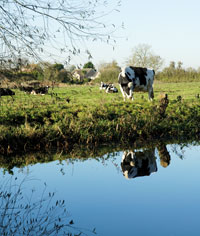Farmers opinions sought as water managment plans unveiled

Martin Booth, Water Framework Directive programme executive, explains what the Environment Agency plans for managing water quality could mean for farmers
The Water Framework Directive was introduced in 2000 to improve water environments such as lakes, streams and rivers, as well as to unify water regulations across Europe.
Previously, all of these issues had been looked at separately. But from next year they will brought together, so issues such as supply, quality and managing habitats will no longer be considered in isolation.
This should help improve standards, but it means a more systematic approach will be needed in every aspect of the water environment.
For example, river quality was previously assessed through a narrow set of six chemical and biological criteria. Under the WFD, which applies to all surface and ground waters, surface water quality will be assessed by monitoring 37 different criteria.
This will provide a clearer picture of the status of water bodies, looking at how well they can support plant and animal life.
Implementing the WFD requires each EU country to create River Basin Management Plans (RBMPs), outlining a six-year cycle of planning, action and review of improvements.
The Environment Agency has prepared draft RBMPs for all nine of the river basins in England and Wales, which are now on our website. These proposals are open to public comment as part of a wide-ranging consultation running until 22 June.
There can be no denying that the WFD will have an impact on farming practices and land management, particularly with regards to reducing pollution.
Although great strides have been made – annual pollution incidents from agriculture are 16% less now than in 1990 – more progress is required. Nitrate levels in ground water continue to rise and eroded silt from farmland is a serious problem for fish breeding.
About 60% of nitrogen pollution and up to 75% of sediment in watercourses comes from farmland. We want farmers to work with us to tackle these problems, and in doing so they could benefit financially. Soil, nutrient and pesticide losses through runoff are estimated to cost farmers £50m a year.
Comments on RBMPs can be made online, or at workshops being held around the country until June.
We urge farmers to help shape implementation of the directive and help us all achieve a better water environment.
